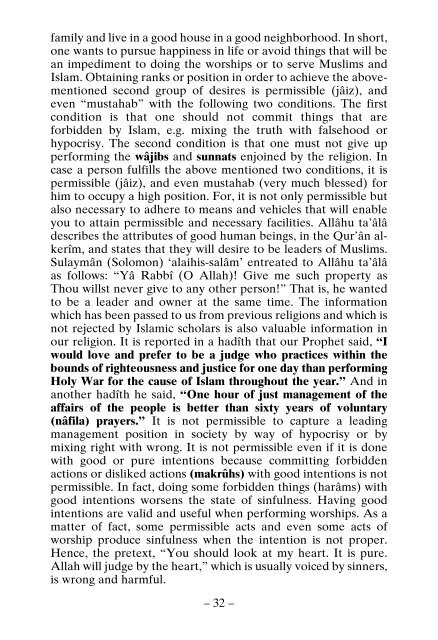Ethics of Islam
Ethics of Islam is taken from the book Berîka by Muhammad Hâdimi. Immorality and ways to get rid of it; 40 depravities and cures to them; usefulness of ethics; what is a soul; strengths of a soul; Personalities emanating from wisdom, courage, chastity and justice are extensively explained.
Ethics of Islam is taken from the book Berîka by Muhammad Hâdimi. Immorality and ways to get rid of it; 40 depravities and cures to them; usefulness of ethics; what is a soul; strengths of a soul; Personalities emanating from wisdom, courage, chastity and justice are extensively explained.
You also want an ePaper? Increase the reach of your titles
YUMPU automatically turns print PDFs into web optimized ePapers that Google loves.
family and live in a good house in a good neighborhood. In short,<br />
one wants to pursue happiness in life or avoid things that will be<br />
an impediment to doing the worships or to serve Muslims and<br />
<strong>Islam</strong>. Obtaining ranks or position in order to achieve the abovementioned<br />
second group <strong>of</strong> desires is permissible (jâiz), and<br />
even “mustahab” with the following two conditions. The first<br />
condition is that one should not commit things that are<br />
forbidden by <strong>Islam</strong>, e.g. mixing the truth with falsehood or<br />
hypocrisy. The second condition is that one must not give up<br />
performing the wâjibs and sunnats enjoined by the religion. In<br />
case a person fulfills the above mentioned two conditions, it is<br />
permissible (jâiz), and even mustahab (very much blessed) for<br />
him to occupy a high position. For, it is not only permissible but<br />
also necessary to adhere to means and vehicles that will enable<br />
you to attain permissible and necessary facilities. Allâhu ta’âlâ<br />
describes the attributes <strong>of</strong> good human beings, in the Qur’ân alkerîm,<br />
and states that they will desire to be leaders <strong>of</strong> Muslims.<br />
Sulaymân (Solomon) ‘alaihis-salâm’ entreated to Allâhu ta’âlâ<br />
as follows: “Yâ Rabbî (O Allah)! Give me such property as<br />
Thou willst never give to any other person!” That is, he wanted<br />
to be a leader and owner at the same time. The information<br />
which has been passed to us from previous religions and which is<br />
not rejected by <strong>Islam</strong>ic scholars is also valuable information in<br />
our religion. It is reported in a hadîth that our Prophet said, “I<br />
would love and prefer to be a judge who practices within the<br />
bounds <strong>of</strong> righteousness and justice for one day than performing<br />
Holy War for the cause <strong>of</strong> <strong>Islam</strong> throughout the year.” And in<br />
another hadîth he said, “One hour <strong>of</strong> just management <strong>of</strong> the<br />
affairs <strong>of</strong> the people is better than sixty years <strong>of</strong> voluntary<br />
(nâfila) prayers.” It is not permissible to capture a leading<br />
management position in society by way <strong>of</strong> hypocrisy or by<br />
mixing right with wrong. It is not permissible even if it is done<br />
with good or pure intentions because committing forbidden<br />
actions or disliked actions (makrûhs) with good intentions is not<br />
permissible. In fact, doing some forbidden things (harâms) with<br />
good intentions worsens the state <strong>of</strong> sinfulness. Having good<br />
intentions are valid and useful when performing worships. As a<br />
matter <strong>of</strong> fact, some permissible acts and even some acts <strong>of</strong><br />
worship produce sinfulness when the intention is not proper.<br />
Hence, the pretext, “You should look at my heart. It is pure.<br />
Allah will judge by the heart,” which is usually voiced by sinners,<br />
is wrong and harmful.<br />
– 32 –

















